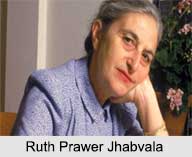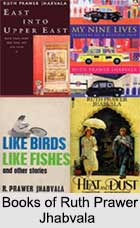 Ruth Prawer Jhabvala is a winner of the prestigious Booker prize who was a German-born British and American novelist, short story writer and two-time Academy Award-winning screenwriter. She is a two-time Academy Award winning screenwriter. She is best known for her long association with Merchant Ivory Productions, made up of director James Ivory and producer Ismail Merchant.
Ruth Prawer Jhabvala is a winner of the prestigious Booker prize who was a German-born British and American novelist, short story writer and two-time Academy Award-winning screenwriter. She is a two-time Academy Award winning screenwriter. She is best known for her long association with Merchant Ivory Productions, made up of director James Ivory and producer Ismail Merchant.
Early Life of Ruth Prawer Jhabvala
Ruth Prawer Jhabvala was born on 7th May, 1927. This Anglo-Indian writer was born in Cologne, Germany. Family of Ruth Prawer Jhabvala was Jewish and in the year 1939 they moved to England from Germany. Her father was Polish-Jewish and her mother was German-Jewish. After the settlement of her family in Hendon, northwest London, Ruth Prawer Jhabvala attended the Country School. In the year 1948, she became a British citizen. She completed her M.A from Queen Mary College in London in English literature in the year 1951. She enjoyed reading the works of Dickens.
Literary Career of Ruth Prawer Jhabvala
Ruth Prawer Jhabvala started writing novels during the 1951`s while she was staying in India. She wrote several novels that were based on her new life. Her work was always regarded as of very high quality. She lived in India for 24 years from 1951. Her first novel, "To Whom She Will" was published in 1955. It was followed by "Esmond in India" (1957), "The Householder" (1960) and "Get Ready for the Battle" (1963). "The Householder" with a screenplay by Jhabvala, was filmed in 1963 by Merchant and Ivory. During her years in India she wrote scripts for the Merchant-Ivory duo for "The Guru" (1969) and "The Autobiography of a Princess" (1975). She collaborated with Ivory for the screenplays for "Bombay Talkie" (1970) and "ABC After-school Specials: William - The Life and Times of William Shakespeare" (1973).
Unlike other writers, she was not drawn by the ancestry of India. She had a different view for India and its traditional societies. Her first two novels earned her critical acclaim as in these two novels she has wonderfully depicted the Indian societies and its various manners in a comic way. She was more into feminine writing. However, unlike the contemporary writers of English literature of India, this author was not that outspoken. Apart from feminism, works of Ruth Prawer Jhabvala was depicted ironically the manners and lives of the Indian societies, Europeans striving to understand India and clashes between the Western and the Eastern cultures. Her novels reflected a sign of detachment of the Western attitudes towards the old fashioned customs of India. However, the German-Jewish heritage of the author has never been projected as the focal point in her work. Her novels and stories are seen from a point of view of an outsider. During the mid 1960`s, Ruth Prawer Jhabvala started her career as a screenwriter with the association of Merchant Ivory Productions. She also wrote several screenplays as well as film adaptations of several novels that include E.M. Foster`s "A Room with a View" and Henry James`s "The Bostonians". Later on, in the year 1982 her novel "Heat and Dust" was also transformed into a film.
 Some of the names of her Selected Novels and collections of short stories are as follows:
Some of the names of her Selected Novels and collections of short stories are as follows:
•To Whom She Will (1955)
•The Nature of Passion (1956)
•Esmond in India (1958)
•The Householder (1960),
•Get Ready for Battle (1962)
•Like Birds, Like Fishes (1963)
•A Backward Place (1965)
•A Stronger Climate (1968)
•A New Dominion (1972)
•Heat and Dust (1975)
•An Experience of India (1971)
•How I Became a Holy Mother and other stories (1976)
•In Search of Love and Beauty (1983)
•Out of India (1986)
•Three Continents (1987)
•Poet and Dancer (1993)
•Shards of Memory (1995)
•East into Upper East: Plain Tales from New York and New Delhi (1998)
•My Nine Lives (2004)
Some of the popular Screenplays written by this eminent writer are :
•The Householder (1963)
•Shakespeare Wallah (1965)
•Bombay Talkie (1972)
•Autobiography of a Princess (1975)
•Roseland (1977)
•The Europeans (1979)
•Jane Austen in Manhattan (1980)
•Heat and Dust (1983)
•A Room with a View (1985)
•Mr. and Mrs. Bridge (1990)
•Howards End (1992)
•The Remains of the Day (1993)
•Jefferson in Paris (1995)
•Surviving Picasso (1996)
•The Golden Bowl (2000)
•Le Divorce (2003)
•The City of Your Final Destination (2008)
Awards of Ruth Prawer Jhabvala
In 1975, she won the Booker Prize for her novel "Heat and Dust" which was later adapted into a movie. She won her first Academy Award for her screenplay for "A Room with a View" (1986) and won a second in the same category for Howards End six years later. She was nominated for a third Academy Award for Best Adapted Screenplay the following year for "The Remains of the Day".
Personal Life of Ruth Prawer Jhabvala
After completing her M.A, Ruth Prawer Jhabvala married an Indian architect and came to India. In the year 1975, she moved to New York City and in 1986 became a US citizen. Her three daughters are living in various parts of the world. In 1986, she became a naturalised citizen of the United States.
Death of Ruth Prawer Jhabvala
Ruth Prawer Jhabvala died in her home in New York City on 3rd April 2013 at the age of 85.
Her death was caused by complications from a pulmonary disorder.













